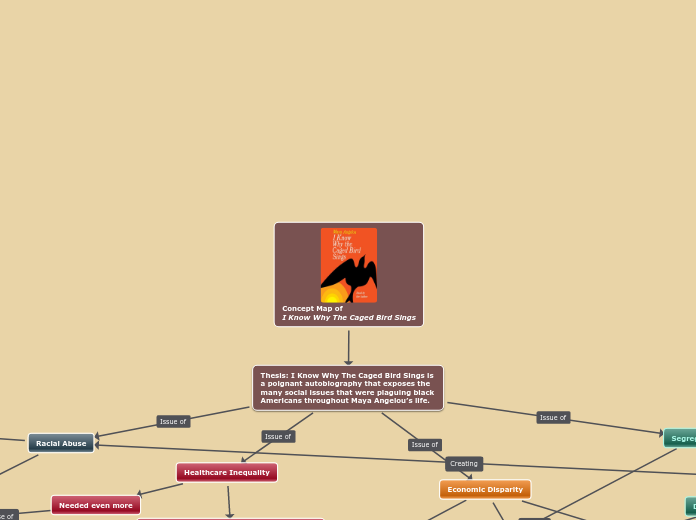af Mathew Estafanous 5 år siden
927
Concept Map of I Know Why The Caged Bird Sings

af Mathew Estafanous 5 år siden
927

Mere som dette
Division between.
“..most Black children didn’t really, absolutely know what whites looked like.” (Angelou 25)
“A light shade had been pulled down between the Black community and all things white” (Angelou 49).
Creating sense of superiority over back people.
With segregation came a sense of dehumanization. Black people were observed as "other" and not truly part of America.
“white folks’ cars and white glistening houses and their children and their women. But above all, their wealth that allowed them to waste was the most enviable. They had so many clothes they were able to give perfectly good dresses, worn just under the arms, to the sewing class at our school for the larger girls to practice on.” (Angelou 49)
White communities and how they are so vastly different. They are wealthy enough to the point of allows them to waste their money.
“a Negro couldn’t buy vanilla ice cream” (Angelou 49)
That these black communities are already struggling to get the basic essentials, like food and clothing.
Very few medical/dental offices allowed black people.
“Annie, everybody has a policy. In this world you have to have a policy. Now, my policy is I don’t treat colored people.” (Angelou 188)
They are forced to travel very far distances for black doctors.
their economic state prevented them from being able to afford professional help.
Ku Klux Klan constantly looking for any reason to kill black people.
"It was fortunate that the boys didn’t ride into our yard that evening and insist that Momma open the Store. They would have surely found Uncle Willie and just as surely lynched him." (Angelou, 18/19)
Common occurrences of lynching and black killings.
“My race groaned. It was our people falling. It was another lynching, yet another Black man hanging on a tree. One more woman ambushed and raped. A Black boy whipped and maimed.” (Angelou, 135)
White people who would make very offensive and dehumanizing remarks to black people.
“my policy is I’d rather stick my hand in a dog’s mouth than in a nigger’s” (189).
Momma is verbally abused by a group of white women. They made teasing remarks at her.
“I realized that she was aping my grandmother. Another said, “Naw, Helen, you ain’t standing like her. This here’s it.” Then she lifted her chest, folded her arms and mocked that strange carriage that was Annie Henderson.” (Angelou, 30-31)